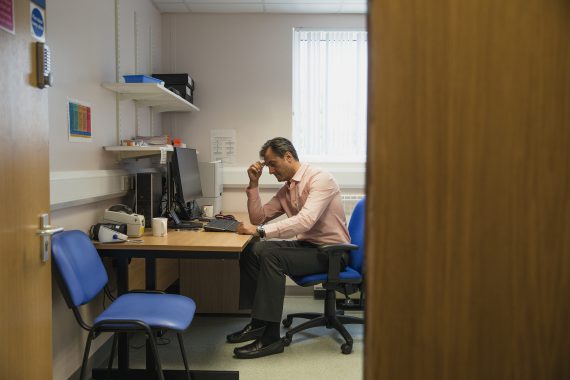Workload warning as Scottish GPs see 10% of patients ‘once per week’

BMA Scotland has issued a GP workforce and workload warning, after findings suggested 10% of the population are having one GP appointment per week.
A BMA survey received 375 responses, accounting for 41% of GP practices in Scotland with a total number of 2,592,804 patients.
This makes up 45% of the total number of patients registered with GP practices in Scotland.
Between the 4 and 8 October, a total of 221,420 appointments were carried out by the survey respondents.
If the same rate of consultations to number of patients is applied to Scotland’s total population, more than 500,000 appointments would have occurred in one week in general practice.
All practices surveyed were carrying out daily face-to-face appointments.
The survey also found:
- 83% of practices said demand was exceeding capacity.
- 42% of practices said demand was ‘substantially’ exceeding capacity.
- 4% said capacity was exceeding demand.
- 88% of practices said a staff member had been subjected to verbal or physical abuse in the last month.
- 78% said the abuse had worsened since May 2021, when the BMA last asked this question.
- 1% said the abuse had improved since May.
- 28% of practices reported having at least one GP vacancy. BMA Scotland estimates there could be up to 225 WTE vacancies in GP practices across Scotland.
BMA Scotland GP Committee chair Dr Andrew Buist said: ‘The 500,000 appointments in general practice per week is still not enough to meet current patient demand in Scotland. That number of appointments is straining our workforce and GPs and their teams simply cannot sustain this indefinitely.
‘We already knew we were desperately requiring additional GPs – so we welcomed the 2017 Scottish Government commitment for at least 800 more – the results of this survey make it all the more urgent.
The commitment is there on all sides, but we need to see that backed up by a renewed focus on retention and recruitment of GPs so we can boost overall numbers. We cannot allow overall numbers in the GP workforce to stall as recent figures show they did between 2013 and 2019.’
The BMA’s survey also showed that nine in 10 practices said a staff member had suffered verbal or physical abuse in the past month.
To which Dr Buist said: ‘I appreciate difficulty getting an appointment can cause understandable frustration at times – but it can never be acceptable when this spills over into abuse, which our survey shows is still happening and indeed may be getting worse.’
He added that it has to be ‘absolutely clear, once and for all, that this is totally unacceptable and will not be tolerated’, calling on ‘all politicians to go on emphasising the position’
‘No one – and least of all those people in caring services – should face abuse for doing the best they can in the extremely trying circumstances set out above.’
It comes as the Scottish Government announced a £300m funding package for the NHS and social care, but health secretary Humza Yousaf said he would ‘expect to see an increase in GP face-to-face appointments’ as a result of the new funding.
Pulse October survey
Take our July 2025 survey to potentially win £1.000 worth of tokens

Related Articles
READERS' COMMENTS [3]
Please note, only GPs are permitted to add comments to articles











According to a BMA survey, 41% of practices in Scotland have 45% of the registered patients.
So clearly 90.2% of the Practices have 99% of the patients, and 91 % of Practices have 100% of the Registered patients.
So:
WHAT ARE THE OTHER 9% OF SCOTTISH PRACTICES DOING, SEEING AS THEY DO NOT HAVE ANY PATIENTS LEFT?
DC – I’m not sure your maths is right here. You have assumed that all practices are the same size, which is clearly not the case. The average practice size of those responding where slightly higher than the average practice size of those who did not respond.
Well done the BMA, you know sometimes I think some of us are a bit harsh on those chaps.
This is an incredibly important not to say game changing survey, Pulse usually supply a link to a publication, but I cannot see one here, perhaps someone could help. Presumably there is more to come, hopefully, the rate of increase in demand, how many request daily appointments, I always found those difficult.
In retirement the stories come thick and fast, harrowing and frightening
Sorry Dr Buist, but it is a bit more than frustration, start thinking fear, and panic.
There have been many wonderful books addressing the problems with the NHS, but by and large they do not address this. To doctors it is a clear issue and problem,however I can report from retirement land, not so to patients taxpayers and the public. Explaining this issue to them is difficult, particularly as they have a deep inbuilt desire to avoid it
This survey, and hopefully many subsequent ones expanding on the theme will make explaining to patients so much more authoritative, and hopefully lead them to face the issue. Only when they are prepared to take this to their MP will there be any change